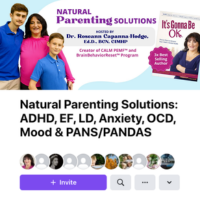Many kids and teens come to me with a diagnosis of Oppositional Defiant Disorder (ODD), which means that they have a hard time with the word, “no” and don’t easily follow rules or requests. Kids with ODD face many challenges in the classroom, at home and socially. Their constant agitation, poor impulse control and simple lack of pleasantries cause others to push away from these kids, which further exacerbates their issues.
Even though ODD may be a clinical disorder, I think of oppositional and defiant behaviors as issues that are always part of another clinical issue or condition. These are kids that have so much bubbling inside that they say, “NO!’ to just about everything because they are so dysregulated. The question is if it isn’t ODD, then what is it? Well, understanding what are the components of oppositional and defiant behavior is the first step to figuring out what could be the root cause of ODD.
What is Oppositional Defiant Disorder (ODD)?
According to the Diagnostic and Statistical Manual, Fifth Edition (DSM 5), Oppositional Defiant Disorder is a pattern of angry/irritable mood, argumentative/defiant behavior, or vindictiveness lasting at least 6 months as evidenced by at least four symptoms of the following categories, and exhibited during interaction with at least one individual who is not a sibling.
Angry/Irritable Mood
- Often loses temper
- Is often touchy or easily annoyed
- Is often angry and resentful
Argumentative/Defiant Behavior
- Often argues with authority figures or, for children and adolescents, with adults
- Often actively defies or refuses to comply with requests from authority figures or with rules
- Often deliberately annoys others
- Often blames others for his or her mistakes or misbehavior
- Vindictiveness
- Has been spiteful or vindictive at least twice within the past 6 months.
What are the Signs and Symptoms of ODD?
Parenting a child or a teen with ODD is extremely difficult. You know that every time you say, “No”, there will be a battle. Kids who are oppositional simply are hard to parent because they are so inflexible. Oppositional kids aren’t “go with the flow” kind of kids and the littlest things can cause them to explode.
So what does ODD look like in the real world? Well they are prone to many behaviors including:
- High frequency and intensity temper tantrums
- Long recovery time from tantrums
- Frequent emotional outbursts
- Poor self-regulation
- Excessive arguing
- Actively refusing to comply with requests and rules, especially when when they have to transition from one activity to another
- Low frustration tolerance
- Highly sensitive and easily annoyed
- Can be annoying toward others with little impulse control
- Tend to blame others for their mistakes and lack insight into their behavior
- Can be spiteful and seek revenge
- Prone to swearing, obscene language, and being hurtful with words
What are Issues That Are Often Misdiagnosed as ODD?
ODD is often misunderstood and frequently misdiagnosed. The behaviors associated with ODD, anger, irritability, arguing and defiant behavior are very real but are typically rooted in another often missed clinical condition. It is so important to identify the root cause otherwise behaviors, thoughts, sensations, and feelings can’t adequately be addressed. Remember, you can’t get the right treatment unless you have identified the right underlying issues!
Here are common root cause issues of oppositional and defiant behaviors that should be considered:
Want to learn more about ODD and how to identify root causes and treat non-compliant and defiant behaviors, read my blogs:
Always remember… “Calm Brain, Happy Family™”
Are you looking for SOLUTIONS for your struggling child or teen?
Dr. Roseann and her team are all about solutions, so you are in the right place!
There are 3 ways to work with Dr. Roseann:
You can get her books for parents and professionals, including: It’s Gonna Be OK™: Proven Ways to Improve Your Child’s Mental Health, Teletherapy Toolkit™ and Brain Under Attack: A Resource For Parents and Caregivers of Children With PANS, PANDAS, and Autoimmune Encephalopathy.
If you are a business or organization that needs proactive guidance to support employee mental health or an organization looking for a brand representative, check out Dr. Roseann’s media page and professional speaking page to see how we can work together.
Dr. Roseann is a Children’s Mental Health Expert and Therapist who has been featured in/on hundreds of media outlets including, CBS, NBC, FOX News, PIX11 NYC, The New York Times, The Washington Post,, Business Insider, USA Today, CNET, Marth Stewart, and PARENTS. FORBES called her, “A thought leader in children’s mental health.”

She is the founder and director of The Global Institute of Children’s Mental Health and Dr. Roseann Capanna-Hodge. Dr. Roseann is a Board Certified Neurofeedback (BCN) Practitioner, a Board Member of the Northeast Region Biofeedback Society (NRBS), Certified Integrative Medicine Mental Health Provider (CMHIMP) and an Amen Clinic Certified Brain Health Coach. She is also a member of The International Lyme Disease and Associated Disease Society (ILADS), The American Psychological Association (APA), Anxiety and Depression Association of America (ADAA) National Association of School Psychologists (NASP), International OCD Foundation (IOCDF) International Society for Neurofeedback and Research (ISNR) and The Association of Applied Psychophysiology and Biofeedback (AAPB).
© Roseann-Capanna-Hodge, LLC 2023
Disclaimer: This article is not intended to give health advice and it is recommended to consult with a physician before beginning any new wellness regime. *The effectiveness of diagnosis and treatment vary by patient and condition. Dr. Roseann Capanna-Hodge, LLC does not guarantee certain results.













